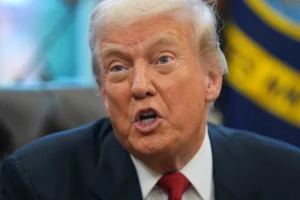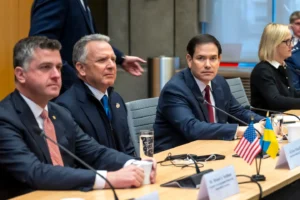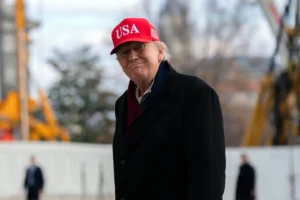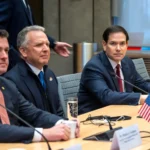At Historic Summit, Biden Pledges Greater Cooperation with Japan, South Korea
The president’s first meeting with foreign leaders at the storied Camp David retreat represented a breakthrough in Indo-Pacific trilateral cooperation
- Published In: Politics
- Last Updated: Aug 19, 2023
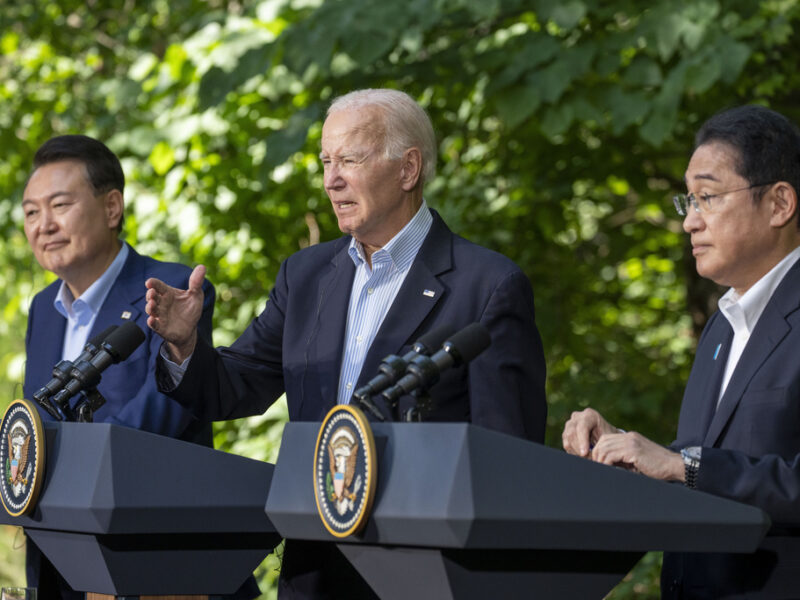
At a summit in Camp David, President Joe Biden hosted an historic meeting between leaders of South Korea and Japan on Friday. (AP Photo/Alex Brandon)
By Jacob Gardenswartz
Special to the Wyoming Truth
CAMP DAVID, Md. — As the saying goes, the enemy of my enemy is my friend.
On Friday, President Joe Biden sought to capitalize on that truism with an historic meeting of leaders from two East Asian nations — countries with a history of icy relations dating back decades.
The summit with Japanese Prime Minister Fumio Kishida and South Korean President Yoon Suk Yeol represented not just Biden’s first invitation to foreign leaders at his Camp David retreat, but the first-ever standalone trilateral meeting between the three nations.
The significance was not lost on the president.
“If it seems like I’m happy, it’s because I am,” Biden told reporters at the start of a press conference with his foreign counterparts, shortly after their meetings concluded. He went on to commend the “political courage that you both demonstrated to resolve difficult issues that would’ve stood in the way for a long time.”
The summit was heavy on both symbolism and substance, producing concrete takeaways that could have lasting implications for Washington and Wyoming.
By situating the meeting at Camp David, the president tacitly evoked the many historical examples of international agreements brokered in the Catoctin Mountain retreat, where, for example, President Jimmy Carter negotiated an historic peace treaty between Israel and Egypt in 1979, and President Franklin Roosevelt met with British Prime Minister Winston Churchill to talk military strategy during World War II.
“I can think of no more fitting location to begin our next era of cooperation — a place that has long symbolized the power of new beginnings and new possibilities,” Biden said.
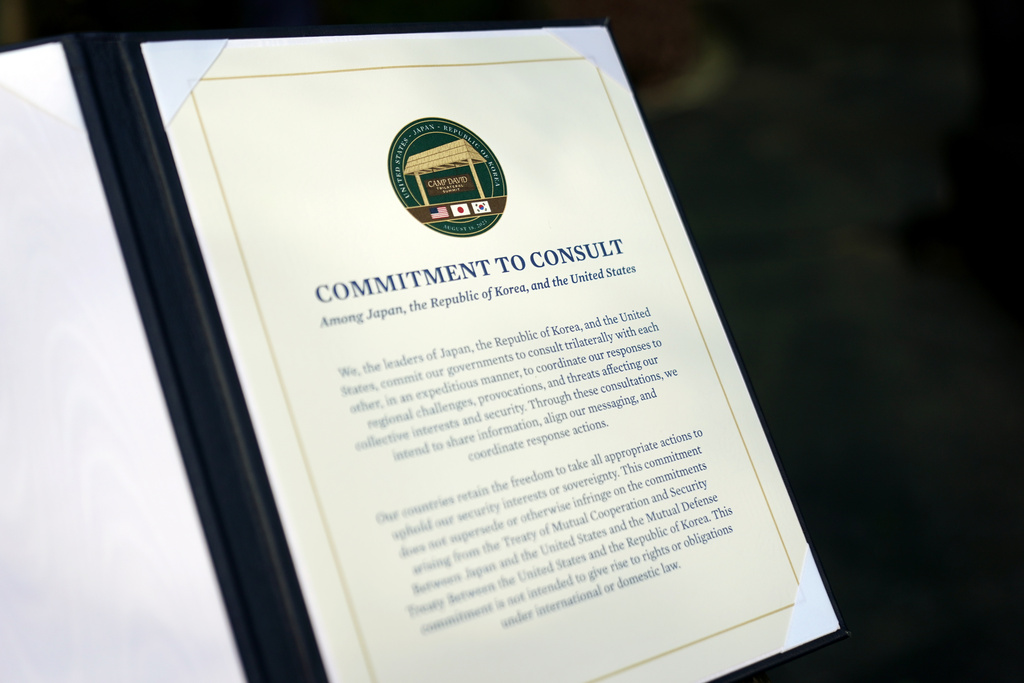
After the meetings concluded, the leaders announced new commitments to expand on defense and economic cooperation in the face of growing threats in the region from North Korea and China.
Indeed, those threats were among the motivators for such a unique summit in the first place. Though the U.S. maintains close ties with each nation individually, Japan and the Republic of Korea have for decades been enmeshed in a rivalry dating back to the Japanese occupation of the Korean peninsula during the first half of the 20th century.
But though their historical animosities are far from gone, the urgent threat of North Korea’s nuclear capabilities and China’s economic dominance of the region brought about something of a thawing of their relationships in recent years.
“Our countries are stronger, and the world will be safer as we stand together,” Biden said. “And I know this is a belief that all three share.”
Consultation, military collaboration and a new ‘hotline’
Through joint statements and memoranda released after the summit, including one entitled the “Camp David Principles,” the three nations pledged new collaborations on a slew of defense and economic priorities.
In what was dubbed a “commitment to consultation,” the leaders planned annual, leader-level meetings — something Biden said wouldn’t last just a couple of years, but “forever.” They also pledged to establish a new “hotline” to facilitate easy communication between the countries in times of crisis.
On the defense front, the leaders agreed to conduct yearly multi-domain military exercises, cementing America’s military presence in the region in an about face from former President Donald Trump’s calls for shrinking American engagements there. The leaders also pledged to beef up intelligence sharing, cooperation on ballistic military defense systems and establish a new working group to counter North Korean cyberattacks.
Economically, the three announced greater cooperation between the nations’ development and humanitarian aid agencies, initiatives to promote women’s economic empowerment, and a new warning system to identify and address shortages of crucial products and materials stemming from supply chain issues.
In the wake of the COVID-19 pandemic, the leaders agreed to new measures to strengthen global science and technology cooperation — collaborations between laboratories, new training programs for emerging talent and investments in Biden’s Cancer Moonshot Initiative.
Though clearly an important pretext to the summit, the leaders walked a tightrope when it came to discussing China, issuing a strong condemnation of the nation’s “dangerous and aggressive behavior” in the South China Sea while seeking to avoid further provocation. Earlier this summer, leaders in Beijing suggested America’s attempts to strengthen ties between South Korea and Japan could serve to “increase tension and confrontation in the region.”
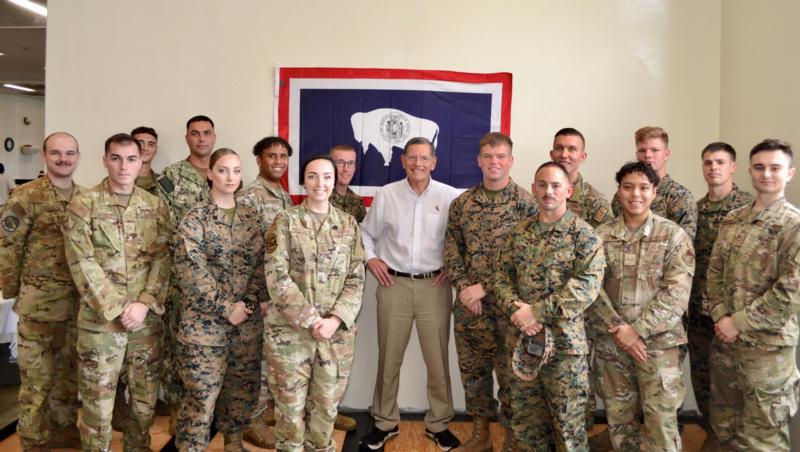
“This summit was not about China,” Biden said in response to a reporter’s question about the nations’ approach to growing PRC influence. Though the topic obviously came up, Biden continued, the meetings were really about “our relationship with each other” and creating a more “peaceful and prosperous Indo-Pacific region.”
What about Wyoming?
Though they live halfway around the world from the nations in question, Wyomingites could still be directly impacted by the topics discussed at Friday’s summit.
Over a dozen Wyoming Marines and Airmen serve at Kadena Air Base in Okinawa, Japan, where Sen. John Barrasso (R-Wyo.) visited last year. America’s military cooperation with Japan and South Korea could have direct implications on their service duties.
“They’re face to face with China and North Korea every day,” Barrasso said of those soldiers in a statement about his visit last November. “We are so proud of their service to protect America and our allies abroad.”
The economic agreements, meanwhile, could have an impact closer to home. In 2021, Japan announced it would help finance the TerraPower nuclear reactor in Kemmerer, a sprawling new development with backing from the U.S. government and Bill Gates. Strengthening America’s economic agreements in the region could help produce other such investments as the global need for nuclear materials grows.
And, of course, many Wyomingites and state political leaders have voiced deep concerns about China’s growing influence. Wyoming officials have been highly critical of Biden’s response to the so-called “spy balloon” which flew across much of the country, and his sale of oil from the Strategic Petroleum Reserve to entities owned by the Chinese government.
More recently, an amendment from Barrasso and Sen. Cynthia Lummis (R-Wyo.) successfully added to the Senate version of this year’s National Defense Authorization Act (NDAA) prohibited foreign nations, including China and North Korea, from purchasing American farmland.
“Wyoming ranchers should not be worried about the Chinese Communist Party setting up shop next to them,” Lummis said in a statement at the time celebrating the amendment’s adoption. “Allowing China, Russia, Iran and North Korea to buy Wyoming farmland is like inviting the fox into the hen house.”
But though they may share Biden’s goal of countering Chinese influence, neither senator was keen to hand Biden any sort of political victory stemming from the summit. Representatives for Lummis and Barrasso did not respond to multiple inquiries about Friday’s event.




